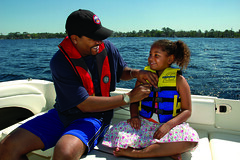Natural Resources Police Urges Safety This Boating Season

With Memorial Day weekend and the start of summer right around the corner, the Maryland Natural Resources Police reminds swimmers, boaters and anglers to be water wise.
Last year was Maryland’s deadliest boating season in two decades, with 21 fatalities. Eighteen of the victims were not wearing life jackets. Late May begins the annual boating boom and the four-month stretch in which the majority of boating accidents occur.
This year, officers will be out in force, targeting unsafe and negligent boaters and those whose judgment is impaired by alcohol or drugs. Extra patrols will be conducting safety checks, and boaters who lack sufficient or have inadequate life jackets will be issued a ticket and returned to the launch ramp.
“You are your own best lifeguard,” Natural Resources Police Superintendent Col. Robert K. Ziegler Jr. said. “Once a boat strikes something in the water or capsizes, it’s too late to reach for a life jacket or to be scrambling to find a way to call for help.”
For many people, the Memorial Day weekend marks the first time they’ll be on the water since fall. Ziegler said it is important to review procedures, do a bow-to-stern inspection, and make sure all required safety gear is on board and in good working order.
Here are five things you should know before you go:
- Make sure everyone on board has a U.S. Coast Guard-approved life jacket. Children under the age of 13 are required to wear a life jacket aboard a boat less than 21 feet long.
- Never boat while impaired. The sun, wind and water can take their toll on boaters. Alcohol and drug use magnifies fatigue and impairs judgment.
- Check weather and tides before heading out. Storms come up suddenly. Don’t think you can outrun a fast-moving squall. Wait at least 30 minutes after the last clap of thunder or flash of lightning before resuming activities.
- Supervise small children and other individuals who cannot swim.
- Carry a cell phone in a waterproof pouch or have a marine radio and monitor VHF Channel 16. Let someone on land know where you are going and when you expect to return.
Check out the Natural Resources Police’s boating check list here.

 1-888-373-7888
1-888-373-7888 233733
233733